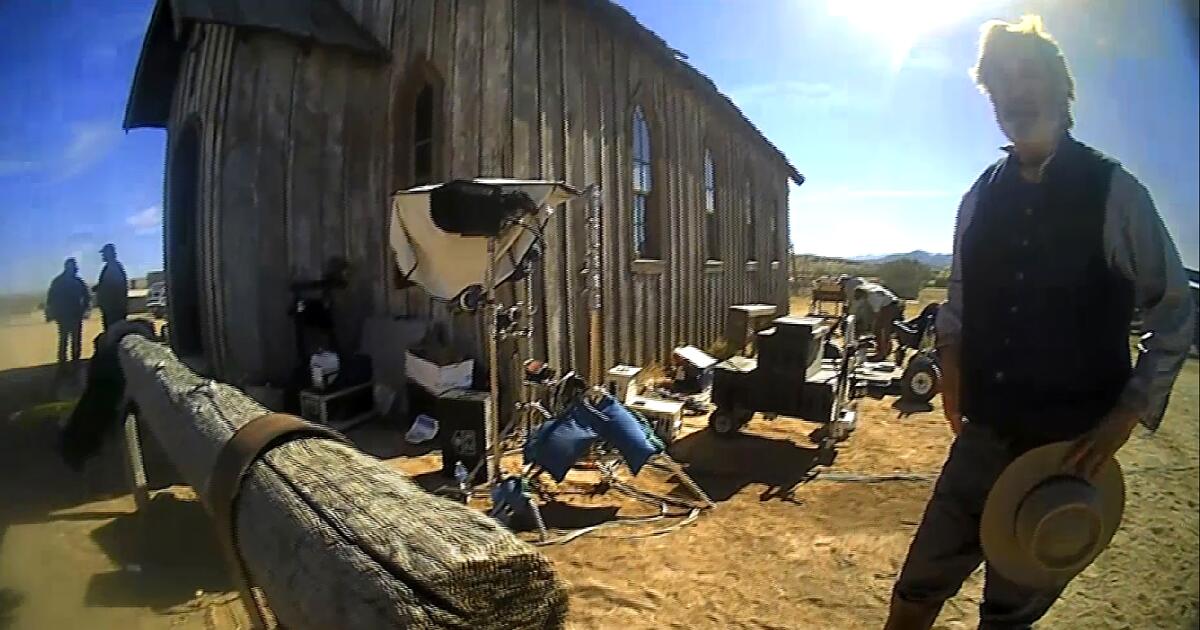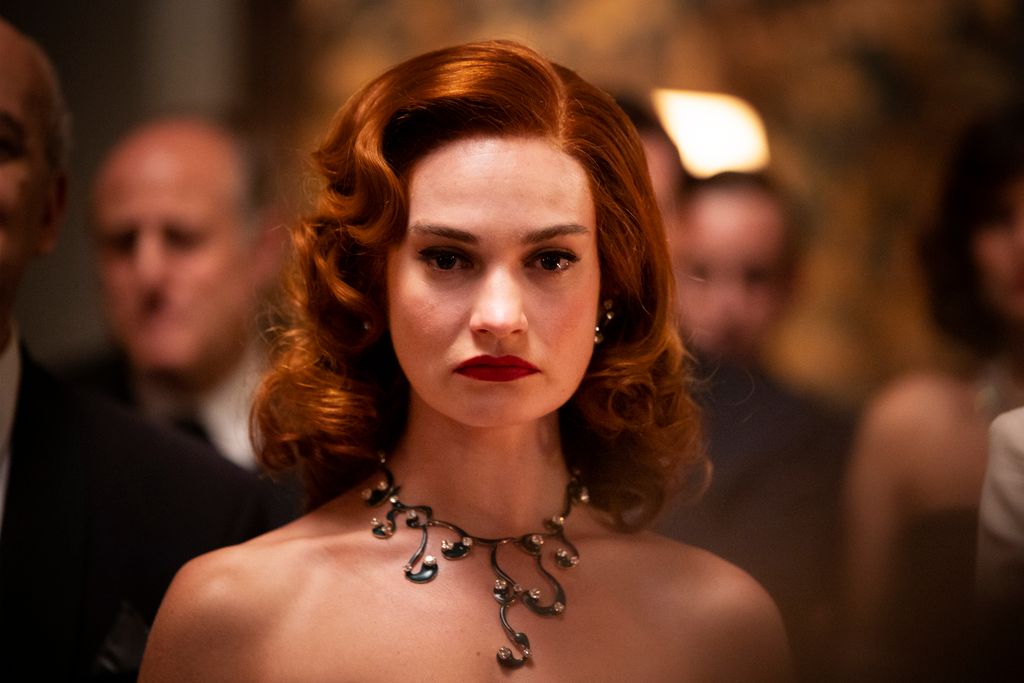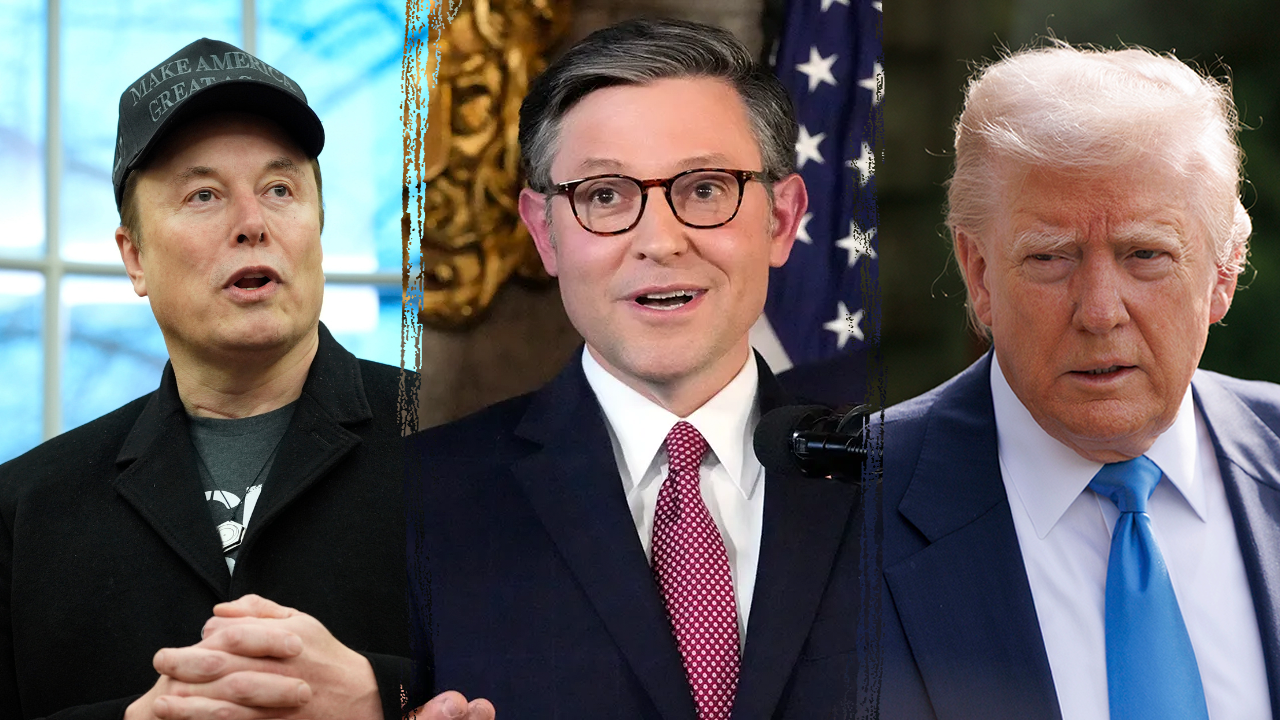Entertainment
New Mexico judge denies Alec Baldwin's motion to dismiss criminal case in 'Rust' shooting

A New Mexico judge denied a motion to dismiss the involuntary manslaughter case against Alec Baldwin, clearing the way for the high-profile actor to stand trial for his alleged role in the deadly “Rust” movie shooting.
New Mexico First Judicial District Judge Mary Marlowe Sommer’s decision late Friday was a setback to Baldwin and his legal team, who had argued that prosecutors were bent on winning a conviction of the 66-year-old actor-producer at all costs following the October 2021 accidental shooting of cinematographer Halyna Hutchins on the low-budget western movie set near Santa Fe.
Baldwin’s trial on the felony charge is expected to begin in July. If convicted, he would face a prison sentence of up to 18 months. He has pleaded not guilty.
In January, grand jurors in Santa Fe County indicted Baldwin on an involuntary manslaughter charge, determining there was sufficient evidence that he acted negligently by pointing a loaded gun at Hutchins without first checking the weapon.
After the indictment, Baldwin’s lawyers pored over transcripts of the grand jury proceedings to try to build a case that Special Prosecutor Kari T. Morrissey had at times shut down testimony that could have been beneficial to their client.
“The state has sought to convict and imprison Baldwin for an accident caused by the mistakes of others,” Baldwin’s attorney Luke Nikas wrote in a motion to dismiss the indictment.
On Friday, Nikas and his law partner Alex Spiro said in an email: “We look forward to our day in court.”
In a hearing last week, Baldwin’s attorneys argued that Morrissey failed in her duty to provide testimony in a “fair and impartial manner.”
Marlowe Sommer on Friday wrote in her 19-page ruling that defense attorneys failed to provide evidence of “prosecutorial bad faith.”
To meet that definition, defense attorneys must show that the prosecutor deliberately misled the grand jury or engaged in “intentional misconduct,” the judge wrote, adding that was not the case in the Baldwin matter.
“The court does not find that defendant has established prosecutorial bad faith,” Marlowe Sommer wrote.
At issue was whether grand jurors were fully informed that they could call witnesses from a list provided by Baldwin’s attorneys. The judge wrote that the special prosecutor read a letter from Baldwin’s side during the proceedings, and that jurors also were allowed to question witnesses.
“Although the State deferred certain questions, in many other instances, the grand jurors asked probative questions, and received complete answers from witnesses, without State interference,” Marlowe Sommer wrote.
Judge Mary Marlowe Sommer, center, talks with prosecutor Kari T. Morrissey, left, and Hannah Gutierrez’s defense attorney Jason Bowles during Gutierrez’s February 2024 trial in Santa Fe, N.M.
(Eddie Moore / Albuquerque Journal)
On the afternoon of Oct. 21, 2021, Hutchins, Baldwin, Souza and about a dozen other crew members were gathered in a rustic church at Bonanza Creek Ranch, south of Santa Fe, to prepare for an upcoming scene. Assistant director David Halls, who was the on-set safety coordinator, handed the gun to Baldwin, declaring that it was “cold,” meaning there was no ammunition inside, according to numerous witnesses.
The actor was sitting in a pew, facing the door of the church. Hutchins and Baldwin had discussed a close-up camera angle of the gun’s muzzle — a view that Hutchins, the director of photography, wanted as a way to heighten the drama in advance of a gunfight scene. Baldwin has said Hutchins told him to slowly pull his Colt .45 revolver from his holster and point it at the camera.
He did, and that’s when the gun went off.
Hutchins died from her wounds. The film’s director, Joel Souza, was injured by the same bullet but has since recovered.
Baldwin’s case has featured numerous twists and turns, including when the actor known for NBC’s “30 Rock” and parodying former President Trump in skits on “Saturday Night Live,” participated in an ABC News interview, broadcast in December 2021, less than six weeks after the tragedy. Baldwin described for news anchor George Stephanopoulos how he pointed the gun at Hutchins and cocked the hammer.
“I didn’t pull the trigger,” Baldwin said, blaming others for the tragedy.
Since then, investigators and FBI analysts have performed tests to demonstrate that Baldwin must have pulled the trigger.
However, during the FBI tests in 2022 at the agency’s lab in Quantico, Va., forensic analysts used a rawhide mallet to strike the gun so hard that components of the gun fractured. Baldwin’s attorney’s have cited the broken parts as evidence that the weapon was compromised before Baldwin handled it.
The first set of prosecutors had to step down after a string of missteps, including an attempt to charge Baldwin on a penalty enhancement that called for a mandatory five-year prison sentence. That penalty wasn’t in effect at the time of the tragedy. The initial prosecutors also made statements about holding Baldwin responsible for his actions, prompting criticism from defense attorneys that such commentary was prejudicial against the actor.
Shortly after Morrissey and her law partner Jason J. Lewis joined the case last spring, they dropped the charges against Baldwin, saying they needed time to review evidence and address legal issues raised by Baldwin’s team.
Last week, Morrissey bristled at suggestions that it was problematic for her to seek an indictment after dropping the charges against Baldwin last year. She said it was Baldwin’s lead attorney, Luke Nikas, who asked for the charges to be dropped, and she agreed.
At the time, the prosecutors said they needed time to investigate whether the gun had been modified prior to its arrival on the film set, as Baldwin’s team has suggested.
Prosecutors have won two convictions for negligence leading to Hutchins’ death.
In March, a Santa Fe jury convicted armorer Hannah Gutierrez of involuntary manslaughter. Morrissey had argued that Gutierrez, whose job was handling the guns, was the most responsible for the tragedy. The jury deliberated only about two hours after hearing evidence during a two-week trial. Last month, Marlowe Sommer sentenced Gutierrez, 26, to the maximum sentence of 18 months in a New Mexico women’s prison.
Last year, Halls pleaded no contest to negligent use of a deadly weapon and received a suspended six-month sentence.

Movie Reviews
Movie Review: New 'Superman' From Director James Gunn | Seven Days

So, yes, the discourse is out of control. It started when Superman writer-director James Gunn suggested to interviewers that the beloved DC Comics hero was an “immigrant.” (Superman is, after all, a refugee from another planet.) The right-wing media sphere riposted by deriding Gunn’s reboot as “woke.” The White House posted a doctored version of the movie poster with the president’s face on the Man of Steel. People spread an unfounded rumor that Gunn was suing over the appropriation. Superman made a lot of money over the weekend, which didn’t silence the naysayers.
It would be absurd to decry the “politicization” of Superman — fiction and politics have always been overlapping spheres. But does the hero’s second full cinematic reboot have a reason to exist beyond offering the latest excuse for online hullabaloo?
The deal
Forget about origin stories. Everybody already knows how Superman reached Earth and was raised by kindhearted Ma and Pa Kent (Neva Howell and Pruitt Taylor Vince). This tale opens in medias res, with young Superman (David Corenswet) already well known in Metropolis, masquerading as Daily Planet reporter Clark Kent and dating fellow newshound Lois Lane (Rachel Brosnahan). Superman isn’t the only “metahuman” in this world, but he is the strongest, and he’s made powerful enemies by foiling the invasion plans of a dictator. (There’s no single glaring analogue to real-world events here, which hasn’t stopped the speculation.)
While the State Department frets over Superman’s unilateral foreign interventions, billionaire Lex Luthor (a wonderfully smug Nicholas Hoult) takes matters into his own hands. Eager to protect his economic interests, he crafts new metahumans to attack Superman.
But Lex’s real coup is a PR smear. Having infiltrated Superman’s Fortress of Solitude, he reconstructs the fragmentary message that Superman’s alien parents (Bradley Cooper and Angela Sarafyan) sent with him to Earth. Turns out the Kryptonians intended Kal-El to rule humanity and not just be our protector, as he’s always assumed. Once the news leaks, the world decides Superman is a wannabe tyrant with a “secret harem.”
It’s a shock to a gee-whiz guy who has only ever wanted to help people. When Lex kidnaps the Superdog, Krypto, Superman gets really pissed off.
Will you like it?
Much has been made of the vibe shift from Zack Snyder’s “gritty,” tormented 2013 version of the Man of Steel to this one. Without a doubt, Gunn’s Superman returns to the sunnier, cornier tone of the 1978 Richard Donner film. Corenswet’s Superman is almost comically good — he rescues kids, dogs, even unwary squirrels — and he isn’t afraid to be uncool. When Lois accuses him of being naïve, he suggests that trust and kindness to others are “the real punk rock.”
It’s the mission statement of an uncynical hero who has been very knowingly designed for an ultra-cynical era. Superman is often a silly movie, much like Gunn’s Guardians of the Galaxy films, yet there’s nothing pandering or sanitized about it.
Indeed, it has one telling resemblance to Man of Steel: Both take place in a 24-7 news culture where everyone is expecting Superman to make a fascist heel turn. The 21st century doesn’t know how to comprehend someone so strong and so decent, but that’s just who this guy is.
The movie manages to make goodness interesting, in large part because its star radiates old-fashioned charisma. Corenswet deploys a slightly dorky charm to play the character as confident without being arrogant, just like original Superman Christopher Reeve. Brosnahan matches him with a tight-wound nerviness reminiscent of Margot Kidder. This Lois already knows Clark’s secret identity, so we get to watch them work out the growing pains of their relationship without secrets. In one deftly written scene, she challenges both his geopolitical savvy and his journalistic ethics — Superman has a questionable habit of interviewing himself.
Somehow this adult romance coexists just fine with the kid-friendly shenanigans of Krypto (who is not a very good boy). Most of the long roster of wacky supporting characters make strong impressions, from a lady-killer Jimmy Olsen (Skyler Gisondo) to a fatuous Green Lantern (Nathan Fillion) to Mr. Terrific (Edi Gathegi), who’s so fearsomely competent that he regards everyone else with a touch of serene disdain. It’s easier to forgive the dullness of the requisite city-wrecking CGI battles with such amusing company.
If you want a more “realistic” Superman or just hate comic-book movies, this Superman isn’t for you. The primary colors, chaotic world-building and goofy, self-referential humor all work in synergy. It’s the kind of movie where the sneering villain has a lair that doubles as an escape vehicle.
But if you’re weary of comic-book movies that take themselves ultra-seriously, Gunn’s Superman delivers. Sure, maybe it’s political, if you think there’s something radical about a Superman who just wants to save people, regardless of their nationality, color or creed. Also, it’s fun.
If you like this, try…
Super (2010; AMC+, Philo, Pluto TV, Roku Channel, YouTube Primetime, rentable): Back when Gunn was a low-budget indie filmmaker, he made this comedy that deconstructs the whole superhero mythos, with Rainn Wilson as a jilted husband homicidally determined to fight evil. It’s equally disturbing and funny.
Man of Steel (2013; HBO Max, YouTube Primetime, rentable): There’s been endless debate over whether Snyder’s edgy version of Superman (Henry Cavill) is the superior one.
Superman (1978; HBO Max, YouTube Primetime, rentable): But most people seem to acknowledge the classic status of Donner’s version, which predated the comic-book conquest of cinema.
Entertainment
Ann Philbin wins the Getty Prize and steers $500,000 to NPR, KCRW and LAist

NPR is receiving a highly symbolic financial boost days before Congress is expected to vote on the fate of federal funding that supports the news and culture nonprofit.
Ann Philbin, former director and current director emeritus of the Hammer Museum at UCLA, has been named this year’s Getty Prize recipient. The honor comes with a $500,000 grant for a nonprofit of the winner’s choice, and Philbin has selected NPR and its Los Angeles member stations, KCRW and LAist.
The prize is considered the Getty’s highest honor and recognizes what the institution calls “cultural leaders whose work expands human understanding and appreciation of arts and culture.” Previous awardees include Frank Gehry, Mark Bradford, Ed Ruscha, Yo-Yo Ma and Thelma Golden.
“I wanted to shine a light on one of the most pressing issues of our day,” Philbin said in a phone interview. “And that’s freedom of speech and freedom of the press.”
Philbin said she requested that half of the Getty grant go to NPR and the other half to be split between KCRW and LAist.
“Those two radio stations for me — and I think for so many Angelenos who spend so much time in their cars — are constant companions,” Philbin said. “We listen to them all the time, and they’re precious to us. To even think about the fact that they might not exist is unbearable.”
NPR Chief Executive Katherine Maher in May filed a lawsuit against President Trump after he issued an executive order directing the Corp. for Public Broadcasting to freeze all funding to NPR and PBS. She said Philbin’s decision to split the donation between NPR and its local affiliates showed a level of understanding about the interdependency of the local and national radio platforms not often mirrored in the national conversation.
“It is an extraordinary gift at an extraordinary time with real, material impact for the stations,” Maher said.
Congress has until the end of the week to vote on a White House proposal known as the rescission bill that would claw back $9 billion in foreign aid and more than $500 million per year in federal funding already approved for the Corp. for Public Broadcasting, which funnels financial support to NPR and PBS as well as local public radio and TV stations across the country.
Trump has been adamant that his allies vote in favor of the rescission package, writing on Truth Social last week that he will withhold support and endorsements from any Republican who doesn’t vote in its favor. He called the Corp. for Public Broadcasting, NPR and PBS “a monstrosity.”
The proposed cuts to the Corporation for Public Broadcasting would total $1.1 billion over the next two years. Federal funding accounts for about 15% of PBS’ budget and 1% of NPR’s budget, according to NPR, but local stations would be the hardest hit and some may not survive, Maher said. If they vanished, she added, they would take with them the kind of hyper-local, community-based reporting that helps forge and maintain a sense of place, identity and purpose, particularly in rural communities.
“That impact is something that is hard to conceptualize, even when you are a member of Congress who represents some of these communities,” Maher said. “Because you spend so much time living with one foot in the world of places like Washington, D.C., and very little time in the areas of the country where broadband services are not reliable or easily available, and cellphone service is not necessarily consistent and universal.”
Philbin noted that NPR’s mission statement is to create a more informed public and to celebrate the diversity of the human experience, and that those values are being challenged by a storm of misinformation.
The Getty Prize was founded in 2013 as the Getty Medal. It was initially given to several individuals each year, but last year it transformed into its current incarnation, honoring a single person who chooses the “pay-it-forward” grant recipient.
Last year’s honoree was Mark Bradford, who chose to steer the grant money to the Arts for Healing and Justice Network, which brings arts programming to minors in the juvenile justice system.
Movie Reviews
Finally Dawn (2025) Movie Review: Fellinie-esque excess and coming-of-age meet the hollowness of Hollywood

You’ve seen this before. A young, unassuming person suddenly gets thrust into the Hollywood limelight as they realize the vanity and hollowness of all the glitter. Saverio Costanzo, who you may know from HBO’s beloved Italian drama “My Brilliant Friend,” is no stranger to the 1950s. “Finalmente l’alba (Finally Dawn)”, which is set in the same period and features an ensemble Hollywood cast, evokes a singular time in Italian movie history when Cinecitta (one of the prominent studios of the time) was known for hosting lavish, sword-and-sandals epics like Ben-Hur.
The young person in question here is Mimosa (Rebecca Antonaci), a doe-eyed movie lover whose love for the medium is quickly established as she, her mother, and a more conventionally attractive older sister Iris (Sofia Panizzi) come out of the latest War movie playing in their local theatre in Rome. As they exit the theatre, discussing the obsession of new-age directors with the futility of the war that they have just suffered, a crew member from Cinecitta spots Iris and invites her to audition for the latest epic about a female pharoah (a sort of Cleopatra parody on first look) played by Josephine (is played by Lily James in the movie). Now, Mimosa just tags along with her sister, but is quickly spotted by Josephine in a corridor and is offered one of the bigger roles in the film.
Now, “Finally Dawn” thereby turns into an endless loop of excess that the American actors and their consequent Italian hosts go on. Much like “La Dolce Vita,” the excess uncovers the hidden hollowness of the world of movie stars that Mimosa so dearly adores from a distance. We quietly follow her footsteps once the shot of the day is captured. However, the film’s more surreal edges keep pushing it further away from making a point.

James’ diva-like rendition of Josphine feels melodramatic to a point where you either feel nothing towards her, or you simply follow along. Her reasons for inviting Mimosa to tag along with them stem from some deep-seated insecurities and personal demons, but the film is never able to establish any of that. Making Josphie feel like a centre-piece that is given more attention than it rightfully needs, even in the movie-within-the-movie scenario.
I mean, it is quite right to establish Mimosa’s moral standpoint, who doesn’t accept being naked for her shot, but then the film also opens up the tragic death of Wilma Montesi — a real-life incident where an extra on a movie set was found dead on the beach; but never does anything about it except using it symbolically. Director Costanzo has said that he wanted to make the movie because of Wilma’s story, and while he is able to draw parallels through Mimosa’s coming-of-age, using Wilma’s story like that felt a bit exploitative to me.
The film also features an ensemble cast, including Joe Keery, Rachel Sennott, Alba Rohrwacher, and Willem Dafoe, but none of them feel like characters who bring something substantial to the table. It also doesn’t help that newcomer Rebecca Antonaci, who has a remarkable screen time, doesn’t evoke the kind of emotional connection the director is going for. Her character, although essential to the film’s proceedings, feels nudged down by the script’s many meandering tendencies.
Eventually, beyond the great production design that quietly brings back the 1950s and some smashing costume work, “Finally Dawn” is unable to elicit anything particularly interesting for the audience to pay heed to. The lion, for instance, is used as a broad metaphor, but much like its existence within the context of the film itself, the metaphor falls flat, and Mimosa’s story; instantly forgettable.
Read More: 20 Best Films from Italian Neorealism
Finally Dawn (2025) Movie Links: IMDb, Rotten Tomatoes, Letterboxd
Finally Dawn (2025) Movie Cast: Lily James, Rebecca Antonaci, Joe Keery, Rachel Sennott, Alba Rohrwacher, Willem Dafoe, Sofia Panizzi
-

 Culture1 week ago
Culture1 week agoTry to Match These Snarky Quotations to Their Novels and Stories
-

 News7 days ago
News7 days agoVideo: Trump Compliments President of Liberia on His ‘Beautiful English’
-
Finance1 week ago
Do you really save money on Prime Day?
-

 Technology1 week ago
Technology1 week agoApple’s latest AirPods are already on sale for $99 before Prime Day
-

 News1 week ago
News1 week agoTexas Flooding Map: See How the Floodwaters Rose Along the Guadalupe River
-
Business1 week ago
Companies keep slashing jobs. How worried should workers be about AI replacing them?
-

 News6 days ago
News6 days agoVideo: Clashes After Immigration Raid at California Cannabis Farm
-

 Politics1 week ago
Politics1 week agoJournalist who refused to duck during Trump assassination attempt reflects on Butler rally in new book


















